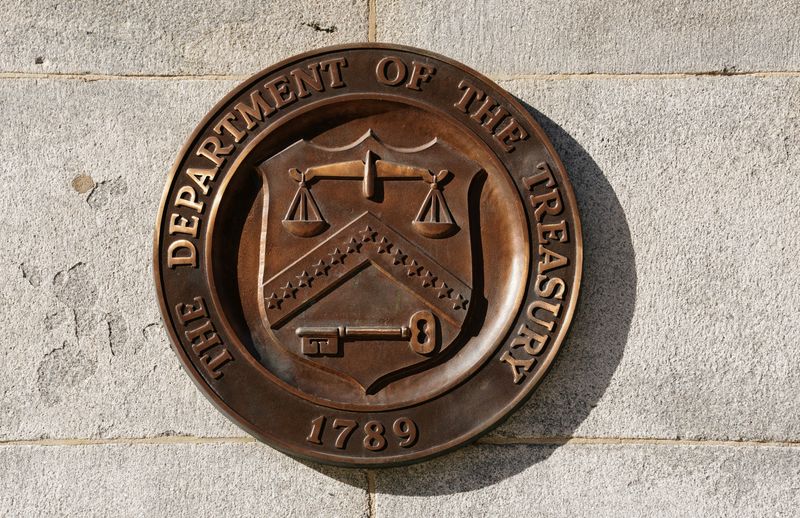

© Reuters. FILE PHOTO: A bronze seal for the Department of the Treasury is shown at the U.S. Treasury building in Washington, U.S., January 20, 2023. REUTERS/Kevin Lamarque/File Photo
WASHINGTON (Reuters) – A program to address the risks of outbound U.S. investment in areas with sensitive technology potentially harmful to national security would cost $10 million if set up this fiscal year, according to a U.S. Treasury Department report obtained by Reuters.
The report surfaced as President Joe Biden’s administration weighs restrictions on outbound investments, and the president prepares to release his proposed budget for the next fiscal year that starts in October.
U.S. lawmakers have been pushing the administration to boost oversight of investments by U.S. companies and individuals in other countries, particularly China, citing concerns over national security and supply chain issues, and have urged the president to issue an executive order.
Congress sought the analysis from the Treasury Department, which would lead any such program’s implementation, as well as a review by the U.S. Commerce Department, which would coordinate with Treasury.
In its analysis, Treasury said it would need about $10 million to set up the program for fiscal year 2023 and that it anticipated Biden would ask for additional resources in his proposal, scheduled to be released on Thursday.
While the president can request resources, it is up to Congress to pass any funding into law.
“I am excited we should expect to see support for outbound investment review reflected in the president’s … budget,” Rosa DeLauro, the ranking Democrat on the U.S. House of Representatives Appropriations Committee, said in a statement. She added that she would seek to support any executive action on outbound investment through legislation.
The Treasury report did not cite China specifically.
“As currently contemplated, the program would … focus on investments that could result in the advancement of military and dual-use technologies by countries of concern. The investments that would be subject to the program are of a nature that they are not presently captured by export controls, sanctions, or other related authorities,” it said.
Commerce Secretary Gina Raimondo, speaking at a Bloomberg News event on Thursday, said any ultimate restrictions on U.S. investors should not “be overly broad,” and added that the department was considering a “pilot program” on outbound investment controls.
Asked by Reuters after the event how long it would take to put restrictions in place, Raimondo said: “months not years for sure. We’re on it every day working it. We’re talking to industry, talking to stakeholders, talking to Treasury whose going to have to administer this.”
The Commerce Department, in a separate report to Congress seen by Reuters on Saturday, said it would need adequate resources to take action but did not cite a specific amount, adding that it expected Biden’s budget to seek additional funding.






